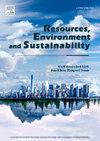Introducing the concept of “resource scapes” to account for water, energy and biomass resources’ nexus dependencies and governance
IF 12.4
Q1 ENVIRONMENTAL SCIENCES
引用次数: 0
Abstract
Existing methods for resource nexus analysis do not cover all aspects of complex resource management problems. Key methodological challenges include setting the scale, scope, and resolution of a nexus analysis, as well as adequately representing the quantity and quality of resource interactions. Additionally, determining the degree of collaborative governance for resource management, accounting for the role of existing policies, and developing robust scenarios for future predictions are also crucial constraints. To address these limitations, we developed a conceptual model of the resources nexus for Otta valley in Norway, an area characterized by resource use trade-offs across interconnected systems. We introduced the concept of “resource scapes” which is the physical availability, key interactions, management networks, and policies governing a resource at a specific time and place. We defined resource scapes for water, energy, and biomass resources in the studied area. Employing stock and flow loops, social network analysis, material flow accounting, and policy reviews, we developed the model in a layered topology using the coupled component modeling approach. In addition, we developed future resource scenarios nested within national pathways – the Norwegian nexus pathways (NNPs) – aligned with the five globally adopted shared-socioeconomic pathways (SSPs), using a narrative downscaling approach. Our results show that annual variations in resource balances are connected to changing externalities. A low Network External-Internal (EI) index (0.392) indicates weak overall collaborative governance of nexus resources. Our modeling framework (1) addresses limitations in current nexus methods, (2) facilitates testing of alternative policy interventions under future scenarios, and (3) provides a framework for development of integrated assessment models. This approach merges the concept of nexus governance with integrated assessment modeling, thereby enhancing the application of nexus approach for efficient resource management which will be crucial in future as climate and socioeconomic conditions evolve.

引入“资源景观”的概念,以解释水、能源和生物质资源的关联依赖关系和治理
现有的资源关系分析方法不能涵盖复杂资源管理问题的所有方面。关键的方法挑战包括设置关系分析的规模、范围和解决方案,以及充分表示资源相互作用的数量和质量。此外,确定资源管理的协作治理程度、考虑现有政策的角色以及为未来预测开发健壮的场景也是关键的限制因素。为了解决这些限制,我们为挪威的Otta山谷开发了一个资源联系的概念模型,该地区的特点是在相互关联的系统之间进行资源使用权衡。我们介绍了“资源场景”的概念,即物理可用性、关键交互、管理网络和在特定时间和地点管理资源的策略。我们在研究区域定义了水、能源和生物质资源的资源景观。利用库存和流量循环、社会网络分析、物料流会计和政策审查,我们使用耦合组件建模方法在分层拓扑中开发了模型。此外,我们开发了嵌套在国家路径中的未来资源情景-挪威联系路径(NNPs) -与全球采用的五个共享社会经济路径(ssp)保持一致,使用叙事缩小方法。我们的研究结果表明,资源平衡的年度变化与外部性的变化有关。网络外部-内部(EI)指数较低(0.392)表明网络资源整体协同治理较弱。我们的建模框架(1)解决了当前联系方法的局限性,(2)促进了未来情景下替代政策干预的测试,(3)为开发综合评估模型提供了框架。这种方法将关联治理的概念与综合评估建模相结合,从而加强了关联方法在有效资源管理方面的应用,随着气候和社会经济条件的发展,这在未来将至关重要。
本文章由计算机程序翻译,如有差异,请以英文原文为准。
求助全文
约1分钟内获得全文
求助全文
来源期刊

Resources Environment and Sustainability
Environmental Science-Environmental Science (miscellaneous)
CiteScore
15.10
自引率
0.00%
发文量
41
审稿时长
33 days
 求助内容:
求助内容: 应助结果提醒方式:
应助结果提醒方式:


